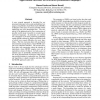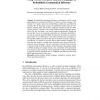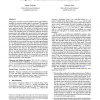16 search results - page 2 / 4 » Approximate inference for first-order probabilistic language... |
IJCAI
2001
13 years 6 months ago
2001
A new, general approach is described for approximate inference in first-order probabilistic languages, using Markov chain Monte Carlo (MCMC) techniques in the space of concrete po...
CORR
2006
Springer
13 years 5 months ago
2006
Springer
In probabilistic grammatical inference, a usual goal is to infer a good approximation of an unknown distribution P called a stochastic language. The estimate of P stands in some cl...
POPL
2007
ACM
14 years 5 months ago
2007
ACM
In this paper, we propose a new algorithm for proving the validity or invalidity of a pre/postcondition pair for a program. The algorithm is motivated by the success of the algori...
ESOP
2011
Springer
12 years 9 months ago
2011
Springer
Abstract. The Bayesian approach to machine learning amounts to inferring posterior distributions of random variables from a probabilistic model of how the variables are related (th...
CORR
2012
Springer
12 years 1 months ago
2012
Springer
We address the problem of learning the parameters in graphical models when inference is intractable. A common strategy in this case is to replace the partition function with its B...



